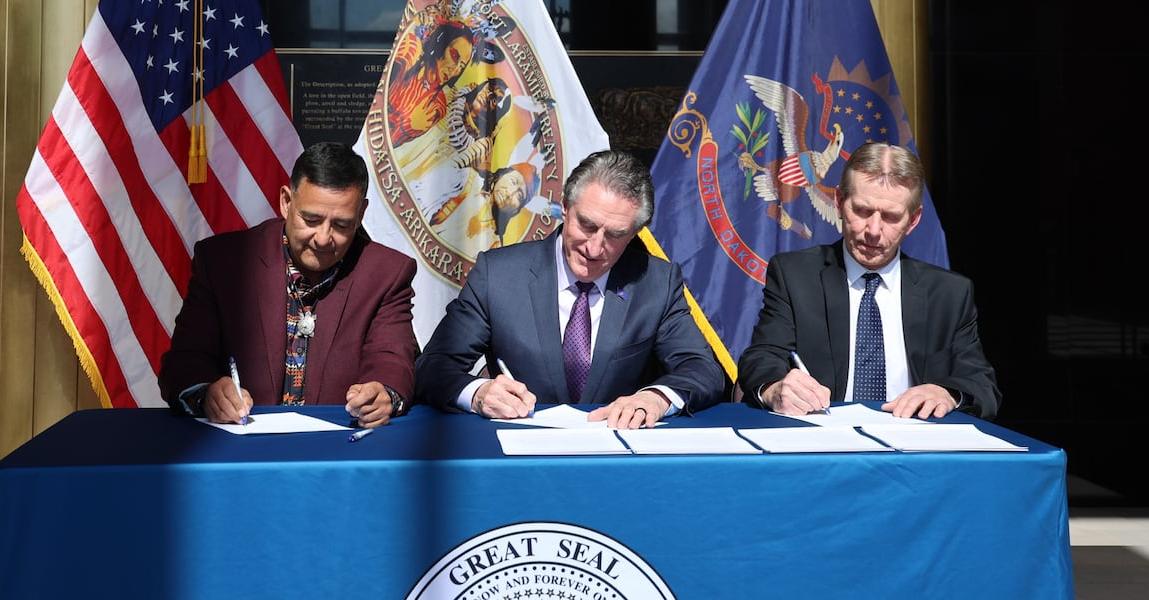
- Details
- By Neely Bardwell
The U.S. Senate on Thursday confirmed former North Dakota Governor Doug Burgum as the 55th secretary of the Department of the Interior by a 78-18 vote.
As Interior secretary, Burgum will oversee the federal department that houses the Bureau of Indian Affairs (BIA), the Bureau of Indian Education (BIE), the Office of the Special Trustee, and the Bureau of Land Management. The Interior secretary also manages 500 million acres of public lands—much of it ancestral tribal territory—along with federal wildlife programs, national parks, and monuments.
The former North Dakota Governor has received support from over 185 Tribal Nations. Many Tribal leaders have expressed that the new Secretary demonstrates a commitment to a government-to-government dialog that honors the cultural values of Indian Country while upholding tribal sovereignty.
During his confirmation hearing, he pledged to support tribal consultation.
“We'd look forward to those discussions with you and, I think, again, as you've described, the key to this is the local consultation,” Burgum said during the hearing. “My experience as governor and working with the tribes and working with local communities in North Dakota, whether it's grazing associations, county commissioners, mayors, rural residents, I think the consultation is key.”
After Burgum's Senate confirmation, the Center for Western Priorities released the following statement from Executive Director Jennifer Rokala:
“Doug Burgum has a choice to make on day one: will he follow the law or follow President Trump’s illegal orders? The Interior secretary has no authority to freeze payments to Tribes, farmers, or water districts across the West — but Trump’s clumsy and chaotic executive orders try to do just that. As a former governor, Doug Burgum knows that thousands of jobs and millions of people depend on funding from the Interior department to keep our water clean, protect communities from wildfires, and help endangered wildlife. The minute Doug Burgum walks in the door at Interior, he needs to make it clear to Westerners that he will keep those funds moving, even if the White House tries to cut them off again.
Burgum was nominated on December 15, 2025, by then-President-elect Donald Trump. He was reportedly chosen due to North Dakota's oil-rich resources. He is expected to fulfill Trump’s “drill, baby, drill” goal, as the Interior Department oversees energy production on public lands and in federal waters.
The U.S. Department of the Interior (DOI) employs around 70,000 people who work in over 2,400 locations across the United States, Puerto Rico, and U.S. territories.
Burgum took office as the 33rd governor of North Dakota on December 15, 2016. Prior to that, he was the CEO of Great Plains. In 2006, he founded Kilbourne Group, a real estate development firm committed to creating smart, healthy cities through vibrant downtowns.
In 2008, he co-founded Arthur Ventures, a venture capital firm that invests in ambitious, mission-driven software companies. In 2009, then-Gov. John Hoeven awarded Burgum the Theodore Roosevelt Rough Rider Award—North Dakota’s highest civilian honor—for his business leadership and numerous philanthropic efforts, including the Doug Burgum Family Fund, which focuses its charitable giving on youth and education.
Burgum graduated with a bachelor’s degree in university studies from North Dakota State University in 1978 and later earned a Master of Business Administration from the Stanford University Graduate School of Business in 1980.
As North Dakota’s governor, Burgum developed relationships with the state’s five tribes. Though tensions arose over his handling of the Dakota Access Pipeline protests, he established regular dialogue with tribal leaders, including the Standing Rock Sioux Tribe.
Burgum succeeds Deb Haaland (Laguna Pueblo), the first Native American to ever serve in a secretarial role in a presidential administration.
More Stories Like This
Native News Weekly (August 25, 2024): D.C. BriefsUS Presidents in Their Own Words Concerning American Indians
Federal Judge Orders ICE to Halt Use of Pepper Spray, Arrests of Peaceful Protesters in Twin Cities
Tunica-Biloxi Cultural Leader John D. Barbry Walks On
Next on Native Bidaské: Federal ICE Activity in Minneapolis: Ruth Buffalo’s Perspective
Help us defend tribal sovereignty.
At Native News Online, our mission is rooted in telling the stories that strengthen sovereignty and uplift Indigenous voices — not just at year’s end, but every single day.
Because of your generosity last year, we were able to keep our reporters on the ground in tribal communities, at national gatherings and in the halls of Congress — covering the issues that matter most to Indian Country: sovereignty, culture, education, health and economic opportunity.
That support sustained us through a tough year in 2025. Now, as we look to the year ahead, we need your help right now to ensure warrior journalism remains strong — reporting that defends tribal sovereignty, amplifies Native truth, and holds power accountable.
 The stakes couldn't be higher. Your support keeps Native voices heard, Native stories told and Native sovereignty defended.
The stakes couldn't be higher. Your support keeps Native voices heard, Native stories told and Native sovereignty defended.
Stand with Warrior Journalism today.
Levi Rickert (Potawatomi), Editor & Publisher


